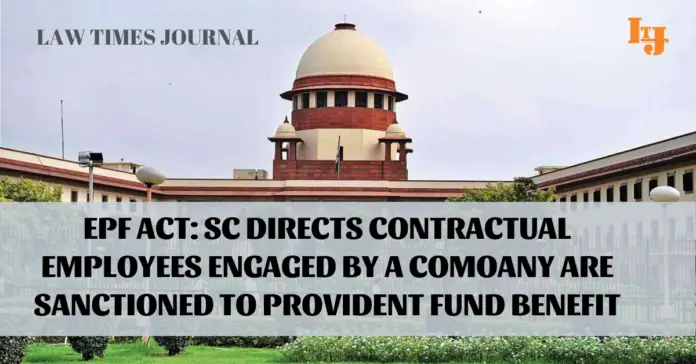
Name of the Case: M/S Pawan Hans Limited vs. Aviation Karamchari Sanghat
Case No: Civil Appeal No 353 of 2020
Quorum: Hon’ble Justice Uday Umesh Lalit and Indu Malhotra
The Hon’ble Supreme Court has held that Contractual Employees engaged by the company, who by any direct or any indirect means draw their wages or salary from the company are entitled to the all the benefit of the provident fund under the rules and procedures as laid down under the employee’s provident funds and miscellaneous provisions act 1952.
Key Features:
- Exclusion on the grounds of permanent and contractual employees was challenged in the Hon’ble Court.
- The Hon’ble High Court held that a wider and more liberal interpretation needs to be made to provide social security of the contractual employees.
- The Supreme Court agreed with the views of the High Court on the grounds of twin test of ownership of the government and secondly the employees should be a benefit as per the rule and scheme framed by the central or state government governing such benefits.
Facts:
The company was incorporated in the year 1985 under the Companies act 1956. The Government of India holds 51% shareholding and the remaining 49% is held by the Oil and the Natural Gas Company Ltd. (ONGC).
The primary objective of the company was to provide helicopter and charter services for promotion of tourism in hilly areas.
The company drafted its Pawan Hans Employees provident Fund Trust Regulation. The total workforce was of 840 employees in which 570 were regular and the rest 270 were on a contractual basis. The company had made an exception in the definition of the term employee and excluded the contractual working people from the said benefit.
Issues:
Whether the contractual employees of the appellant company are entitled to provident fund benefits under the Pawan Hans employee’s provident fund trust regulations or the employee’s provident fund scheme 1952?
The High Court verdict:
The Hon’ble High Court allowed the writ petition filed by the trade union because the liberal view has to be adopted in extending the social security benefits to the contractual employees.
The Company disappointed by the verdict of the HC challenged the same in the Hon’ble SC because it is excluded from the applicability of the provision of the EPF Act and the EPF scheme.
The Supreme Court verdict:
The SC agreed with the views of the HC. The Supreme Court gave two tests to provided exemptions of ownership of the government and secondly the employees should be a benefit as per the rule and scheme framed by the central or state government governing such benefits. The company failed to follow the second test and therefore the exemptions cannot be claimed under Section 16(1) (b) of the EPF Act.
Edited by Vartika Gajendra Singh
Approved & Published – Sakshi Raje





